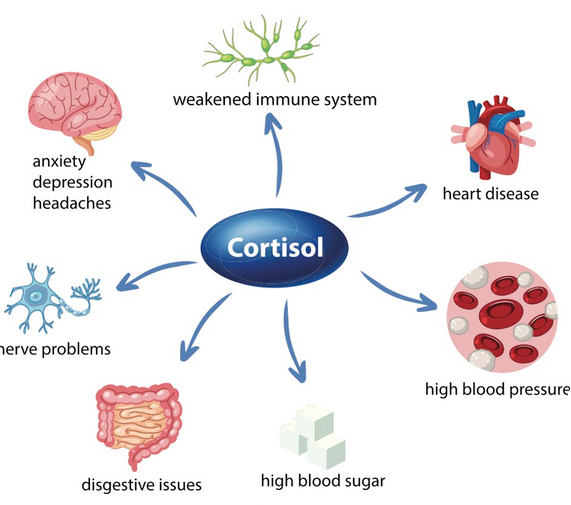Physical Factors
The way physical changes in the body occur in response to our thoughts, feelings and reactions is not fully understood.
However, here are some possible mechanisms. When we are stressed, we release hormones, which help us to cope. These cause problems if they are regularly released into our blood-stream.
Stress Hormones and their Effects

The body’s stress hormones, which include adrenaline and cortisol, are designed to have a short term effect, giving us enough physical energy and strength to get out of dangerous situations. This surge of ‘Fight-Flight’ hormones can have temporary effects such as a raised heart rate, sweating, shaking, shortness of breath etc. However, when these hormones are released frequently, they are thought to have a longer term effect on the body. They start to affect how the body as a whole works.
Researchers in this area seem to think that it may make it harder for the body to keep all of its organs and systems working as they should, for example:
- The immune system may be less effective when stress hormones are released regularly. This is called chronic stress. This may be because the body focuses on the task it sees as most important, avoiding the threat, rather than doing ‘maintenance jobs’ like detecting infections and keeping them under control, for example.
- Healing is slowed down. Like the immune system, when the body believes it is under attack it puts tasks that are not immediately essential, like repairing damaged cells, on the back-burner. While this doesn’t cause a problem in the short-term, in the long term it can slow down recovery, causing physical problems.
- Digestion, like healing, is also put on the back burner during times of stress which can lead to digestive discomfort such as abdominal pain, nausea, constipation, diarrhoea and bloating, for example.
Psychological Factors
Thinking styles can affect how you feel emotionally and physically. Some common thinking styles make it seem very likely that something bad is going to happen. This can lead to feeling worried, sad or upset regardless of whether the thought is true or not. You may recognise some of the examples on the next page.
Thinking Styles – Your thoughts are not always true

How you think – your ‘thinking style’ – can affect how you feel emotionally and physically. Some common thinking styles make it seem very likely that something bad is going to happen. This can make you feel worried, sad or upset even though the thought is not true.
What you may think when you feel anxious or worried
Thinking the worst – Example, say you are feeling ill – you start thinking ‘These symptoms must be a sign of a very serious illness’
Mind reading – Example – You have told someone your symptoms, and then start thinking ‘They think I’m exaggerating. They probably think it is all in my head’
Predicting the future – Example – You have just got back home from the surgery, and sit down with a cup of tea. Then you think ‘These difficulties will get worse and worse so I won’t be able to return to work as I had hoped’
Overgeneralising – Example – Its later in the evening and you are looking back on the day. You start thinking : ‘I’ve had one bad flare-up so far since my diagnosis. That means I’ll get lots of flare-ups’
Jumping to conclusions – Example – You have collected a new medication for your diagnosis – before you take it you start thinking ‘This new dose of medication won’t work’.
Discounting the positive – Example – you have a good day, and feel quite upbeat for a minute or two. Then you start thinking ‘Today was a better day, but it’s bound to be a one-off.’
Self-criticism and labelling – Example – You make a small mistake, and something spills, or you drop something. You immediately start thinking ‘I can’t do anything right. I’m a failure’
Pressuring language – Example – you notice a job half done, somewhere in the house. You start saying to yourself ‘I should be able to cope with this better and I certainly ought to be doing more around the house’.
Do you recognise any of these thoughts in yourself? Only you can tell. None of these are actually helpful. More than most of them are unlikely to be true.

Next time we look at the bridge which links these thoughts to our lives – how we make sense of the changes in our lives, and what we do, feel and think – yes, in that order – to navigate through them.
